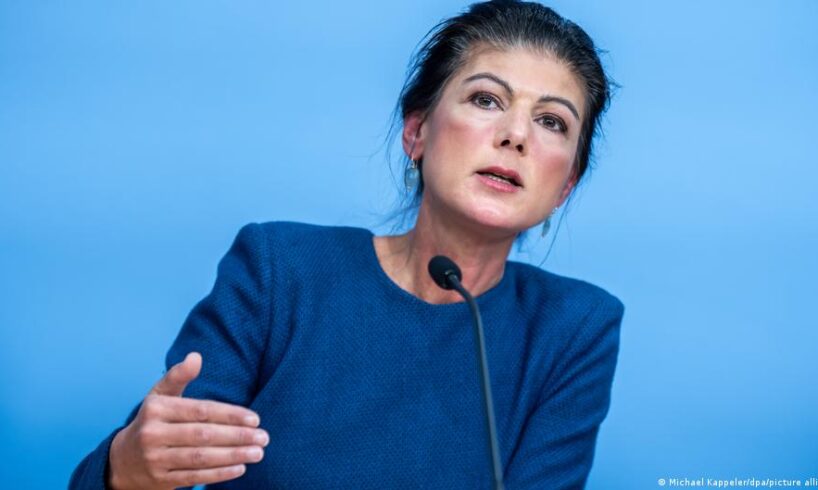
At a press conference on Monday, Sahra Wagenknecht, for decades one of Germany’s best-known and most divisive political figures, announced that she will not run for a leadership position for her Sahra Wagenknecht Alliance (BSW). Instead, the 56-year-old politician says that she envisions leading a commission on fundamental values that has yet to be established.
“I want to clear my head so I can focus on the things that will really help the BSW,” Wagenknecht explained. She went on to say that the BSW’s message had recently become “less clear” to many voters, which has been reflected in falling poll ratings and poor election results.
“We have lost voters, some of them to the AfD [the far-right Alternative for Germany party], and we cannot be satisfied with that.”
Since Wagenknecht founded the BSW in January 2024, the party has positioned itself as left-wing on social and economic issues and yet conservative on cultural issues.
Wagenknecht’s politics are often difficult to pin down: She advocates a higher minimum wage and a cap on rents. But she has long been an advocate of harsh immigration policies.
She has also repeatedly caused a stir by blaming Western countries for Russia’s war of aggression against Ukraine, and she has also been a strong opponent of sanctions against Russia. And like many politicians in the AfD, BSW politicians are also said to have good contacts with proponents of President Vladimir Putin’s regime.
BSW early successes
At the start, her new party enjoyed spectacular success, winning 6.2% of the vote in the June 2024 European elections and earning six seats in the EU parliament.
Far left? Far right? What is Germany’s BSW?
To view this video please enable JavaScript, and consider upgrading to a web browser that supports HTML5 video
Then, in September, double-digit election results propelled the BSW into the state parliaments of the eastern states of Thuringia and Brandenburg, where the party continues to serve in governments today.
Throughout all of the BSW’s election campaigns, it was always Wagenknecht herself who was the face of the party, often featuring as a guest on German political talk shows.
Some within the BSW, however, have accused her of paying too little attention to organizational issues, blaming her for the party’s failure to clear the five-percent hurdle for representation in the Bundestag in the 2025 federal elections.
BSW splits from Left Party
In the period leading up to and during its founding in January 2024, the BSW was all over the news. This was because the new party emerged as a result of prolonged conflict and within the Left Party.
As a lawmaker in the Bundestag, Wagenknecht had been the most prominent representative of the Left Party, but also frequently the source of painful party infighting. When she finally broke away, a total of nine lawmakers followed her to form the BSW.
How are German political parties funded?
To view this video please enable JavaScript, and consider upgrading to a web browser that supports HTML5 video
While the BSW’s star appeared to be rising, many thought that of the Left Party was fading. This prediction proved to be mistaken.
The Left Party went on to win a record 8.8% of the vote in the February general election and since then, its momentum has continued to grow in the polls ever since, especially among young voters.
The BSW, however, garnered only 4.98% of the vote, just a few thousand votes short of the threshold. The party has lodged an appeal with the Federal Election Committee challenging the count, and a decision is still pending.
During the recount in some constituencies, the result for the BSW was subsequently revised upwards: It was awarded 4,200 votes by the Federal Election Committee. However, this was still not enough to secure a seat in the Bundestag — the BSW is still around 9,500 votes short.
Wagenknecht and her colleagues continue to hope for a nationwide recount of the Bundestag election. They accuse parliament of deliberately playing for time and are threatening to take the case to the Federal Constitutional Court in Karlsruhe again. The court had already rejected a lawsuit calling for a recount of the Bundestag election in June.
Those missing votes could be momentous for Germany’s political future: If the BSW were to enter parliament after all, Merz’s government would lose its majority.
Were this to happen, Wagenknecht could make a comeback as parliamentary group leader.
Foreign policy dominates regional elections in Germany
To view this video please enable JavaScript, and consider upgrading to a web browser that supports HTML5 video
The BSW acronym is here to stay
The BSW has already decided what will happen to its name now that its founder will no longer be at the forefront: The abbreviation BSW will remain, and the Sahra Wagenknecht Alliance will become “Bündnis Soziale Gerechtigkeit und Wirtschaftliche Vernunft” (Alliance for Social Justice and Economic Reason).
European Parliament member Fabio de Masi is being touted as the new party leader, who will be elected by delegates to a party conference in December. Amira Mohammad Ali will likely remain in her position as deputy chair.
One of their initial tasks will have to be attracting new members: At the moment, the BSW has fewer than 10,000 nationwide.
This article was originally written in German.
While you’re here: Every Tuesday, DW editors round up what is happening in German politics and society. You can sign up here for the weekly email newsletter, Berlin Briefing.





